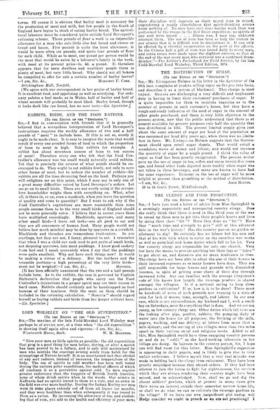LORD WOLSELEY ON " THE OLD SUPERSTITION." (To THE EDITOR
or THE " SPECTATOR.")
Sia,—The maxims of the late Field-Marshal Lord Wolseley may perhaps be of service now, at a time when " the old superstition " is showing itself again alive and vigorous.—I am, Sir, &c.,
" Give your men as little spirits as possible: the old superstition that grog is a good thing for men before, during, or after a march has been proved to be a fallacy, and is only still maintained by men who mistake the cravings arising solely from habit for the promptings of Nature herself. It is an ascertained fact that alcohol of any sort reduces, instead of increases, the temperature of the body. The use of spirits in cold weather has been well tested during the various polar expeditions, the medical officers of which all condemn it as a preventive against cold. No men require greater endurance than the trappers of British North America, none of whom drink spirits when in the woods. Our armies in Iiaffraria had no spirits issued to them as a rule, and no army in the field was over more healthy. During the Indian Mutiny our men were in some places entirely cut off from all liquor for months, and they were healthier than when subsequently it was issued to them as a ration. By increasing the allowance of tea, and abolish- ing that of rum, you add to the health and efficiency of your men; their discipline will improve as their moral tone is raised, engendering a manly cheerfulness that spirit-drinking armies know nothing of. No men have ever don:: harder work than was performed by the troops in the Bed River expedition; no spirits of any sort were issued . . . illness was. I may say, unknown amongst them. The use of rum has been so long the custom in our armies that it is difficult now to discontinue it. It can only be effected by a cheerful co-operation on the part of the officers. In the Crimea half a gill of rum was issued daily to every man, and extra issues were made upon the slightest excuses, so that at the end of the war every man who survived was a confirmed dram- drinker."—The Soldier's Pocketbook for Field Service, by the lat. Field-Marshal Lord Wolseley, Third Edition, 1874.






































 Previous page
Previous page